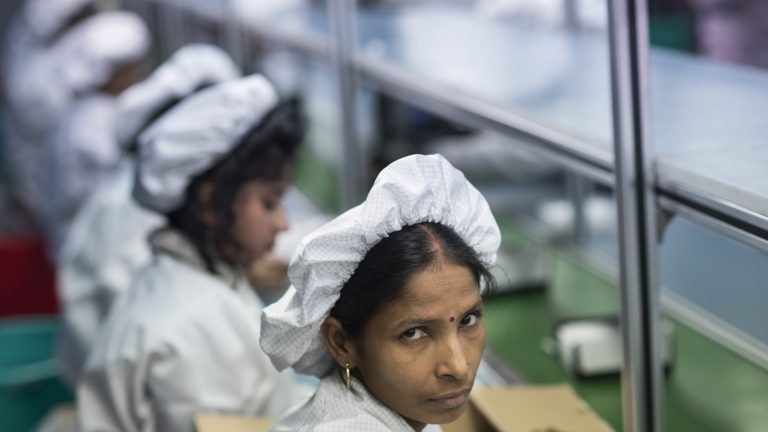In February, the southern Indian state of Karnataka passed a consequential law that extended factories’ work schedules from nine to 12 hours per day, with a 48-hour weekly cap. Apple and its contract manufacturer Foxconn were among the companies that had lobbied for the change, reported Financial Times, as this would allow them to run round-the-clock, 12-hour production shifts at an upcoming facility in the state, similar to their practice in China.
The new law, however, is facing severe pushback from Indian labor unions, who also lodged a complaint with the International Labour Organization (ILO). J.P. Morgan analysts estimate that 25% of Apple products will be manufactured outside China by 2025. Labor issues threaten Apple’s plans for India, which the company views as a key destination for assembling Apple products outside China, alongside Vietnam. The recent tensions in the enforcement of simple labor clauses have laid bare the bottlenecks with improving production capacity in India.
“Now, the clock is turned back. It is against every rule in the labor law book.”
The All India United Trade Union Centre (AIUTUC), along with many activist groups, staged protests in March, burning copies of the bill to express opposition to the extension of working hours. The trade union’s president, K. Radhakrishnan, told Rest of World the liberalized law is detrimental to the health of workers, impermissible under international labor conventions, and dials back century-long strides made by workers’ groups to restrict work to nine hours. “Now, the clock is turned back,” Radhakrishnan said. “It is against every rule in the labor law book.” He was hopeful that the new Karnataka government, which had previously opposed the work hour extension, would withhold the bill, like neighboring state Tamil Nadu.
In April, Tamil Nadu had introduced flexible work hours extending up to 12 hours a day. But the rule was almost immediately shelved following severe pushback from opposition parties and workers’ rights groups. Government allies and unions called the bill “anti-labor.”
In a bid to become a $300 billion electronics manufacturing powerhouse by 2026 — from the current $75 billion — India has rolled out a slew of production incentives to attract investments. The country’s southern states — Karnataka, Tamil Nadu, Andhra Pradesh, and Telangana — have been jostling to woo manufacturers. Karnataka officials had argued that the proposed labor law changes would help boost electronics production by Apple’s contract manufacturer Wistron, which currently operates a facility in the state, and also increase investment from Foxconn.
But analysts believe India needs to do a lot more to grow its electronics manufacturing base. “In China, suppliers and government officials took a ‘whatever it takes’ approach to win orders. There is great emphasis put on efficiency and speed, and India just isn’t operating at that pace [yet],” Sumit Vakil, co-founder of Resilinc, a consultancy that advises companies on supply chain mapping and resilience, told Rest of World.
“Business-friendly labor laws are crucial to encourage more investments in India, especially when there are competing countries with ‘friendlier’ regulations,” Vakil said. For instance, Vietnam’s one-party rule enforces control over labor unionization and offers private companies a greater say in setting the wages, noted Anupam Manur, economist and an assistant professor at think tank Takshashila Institution. “Based on your particular moral persuasion, you might think of this as good or bad,” he told Rest of World. “But the idea is that there’s far fewer strikes and lockouts in Vietnam than in India.” As of June 2022, Apple had reportedly moved 11 factories in its supply chain to Vietnam. This February, Foxconn announced an investment of $300 million to expand its manufacturing facility in north Vietnam.
Still, in a sign of a gradual production shift from China to India, Apple’s 2022 Supplier List, released on May 29, showed the number of suppliers in India increased to 14 from 11 the previous year. China continues to dominate the supplier list, with 151 of the top 188 disclosed suppliers having facilities in the country.
Apple and Foxconn did not respond to Rest of World’s request for comment.




According to Karnataka’s new law, as long as there is written consent from laborers, overtime work can be increased from 75 hours per quarter to 144 hours. The law also allows female employees — who constitute a significant portion of the electronics workforce — to work night shifts. While pro-business groups have hailed these changes as long overdue, workers’ unions consider them a dilution of hard-fought labor rights.
“Our principal objection is that they’ve stopped thinking of workers — and in particular, women — as humans,” Sujata Mody, president of women workers’ union Penn Thozhilalar Sangam, told Rest of World. “The very fact that [companies] can make this proposition to the government means the government is on its back foot, demeaning its own workforce.” Mody was among many activists who supported the 2021 highway sit-in by women workers at Foxconn’s Chennai plant, after over 150 were hospitalized due to food poisoning.
India’s labor laws have long restricted its manufacturing ambitions. Business executives have pointed to the lack of land and labor reforms as leading reasons for why multinationals prefer to set up manufacturing bases in other countries like Thailand, Vietnam, and Bangladesh. The Indian government, under Prime Minister Narendra Modi’s “Make in India” campaign, had introduced ambitious labor reforms in 2021, including flexibility in hiring and firing by industries, but eventually succumbed to popular backlash.
“The philosophy of the Indian labor laws is all about protecting existing labor and making sure they get some sort of wage or income stability, but nothing to do with how you increase labor [participation],” said Manur.
He estimated that a manufacturer entering an Indian state typically deals with as many as 40 national labor regulations, and an equal number of state-level rules. “And many times, these are contradictory,” he said. “So if you’re following laws at the state level, you might be going against the law at the [national] level.” Doing away with at least some of these complexities was what made the Karnataka labor reforms consequential, Manur said. He added that it was disappointing that Tamil Nadu, home to four Apple contract manufacturers — Foxconn, Pegatron, Salcomp, and Luxshare — couldn’t follow through on its labor reform bill. “Given the nature of unemployment in India, I think we should not be worried about protecting the small labor [groups with vested interests],” Manur said.


While none of Apple’s contract manufacturing plants in India have unionized, a Chennai-based labor lawyer aware of the matter told Rest of World that in 2021, over 30 male workers at Foxconn’s plant in Chennai attempted to form a union, and were subsequently dismissed. Individual workers and labor unions have challenged their dismissal in the Kancheepuram labor court, the lawyer said, requesting anonymity to protect their relationship with the union members. Foxconn, which entered India in 2006 assembling units for the now-defunct Nokia phone, had previously dealt with unions representing 2,000 workers.
Electronics manufacturers are able to hire and fire contract laborers more easily in countries like China and Vietnam, as compared to India, said Manur. China’s share of contract labor in total domestic employment went from 4% in 1985 to about 39% in 1995, which underscores the importance of flexible labor laws for a manufacturing boom, he said.
As India aims to become an alternative manufacturing base, it requires a large increase in both efficiency and output, said Resilinc’s Vakil. Currently, one of the key advantages is that Vietnam has lower import tariffs, and free trade agreements with the European Union that allow zero-duty exports. One study found that India’s import tariffs on electronics are 85% higher than Vietnam.
“We are still fighting with the EU on milk exports, and we are losing out unfortunately on electronics exports,” Manur said. “If you don’t have a free trading agreement with the EU, then even the [smartphone makers] who manufacture here [need to pay] a tariff, which makes it uncompetitive. That’s one of the big snags in what Apple and everybody else will find difficult.”
India could achieve a strong competitive differentiation if it strikes a balance between ease of doing business and ensuring protection against labor exploitation, Vakil said. “It must continue to make progress on eliminating red tape. And it must continue to improve its infrastructure.”



